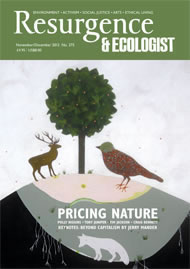E.F. Schumacher is best known for his book Small is Beautiful, but those who wish to know the deep roots of his thinking need also to read A Guide for the Perplexed, which offers us a philosophical framework with suggestions as to how we can raise our consciousness and move towards a more ethical and caring society focused on a sustainable lifestyle.
Despite having originally been published 35 years ago, this book is as pertinent today as it was then, and perhaps even more essential reading. And so we should congratulate the publisher, Vintage, who last summer brought out this special edition, with a new introduction, to celebrate the centenary of Schumacher’s birth.
In this book, Schumacher talks about the moral values that underpin the ideas in his previous work, and calls for a new vision. He suggests that our task is “to look at the world and see it whole”. But the main message of A Guide for the Perplexed is that much of humanity is ‘asleep’ and thus ignorant of what really matters.
Schumacher remarks that throughout school and university he had been given ‘maps’ of knowledge upon which there was hardly a trace of many of the things he most cared about that seemed to him to be of the greatest possible importance for the conduct of his life. The more he became aware of the absence of the things he felt should be on those maps, the more perplexed, unhappy and cynical he became.
As a consequence of this deep dissatisfaction, he had an “inner revelation” that human beings, however learned they might appear, “knew nothing ... about anything that really mattered”. In this Schumacher is not alone, for many great philosophers, poets and thinkers have expressed a similar opinion.
As he says, it is not physical sleep that is our enemy: it is the drifting, wandering, shiftless moving of our attention that makes us incompetent, miserable and less than fully human. Without self-awareness, that is, without a consciousness that is conscious of itself, we human beings merely imagine we are in control of ourselves, that we have free will and are able to carry out our intentions. In fact, we have no more freedom to form intentions and act in accordance with them than has a machine!
This lack of consciousness, as far as Schumacher is concerned, has allowed us to reach the stage where we now believe that humanity is omnipotent. However, even if all the problems we currently face were resolved by technological fixes, we would still remain separated from the higher levels of being that alone can maintain our humanity.
Schumacher believes that individuals have to wake up and actively raise their consciousness if this crisis is to be resolved. His final words in A Guide for the Perplexed ask whether a “turning around” can be accomplished by enough people quickly enough to save the modern world. He concludes that to answer ‘Yes’ would lead to complacency, and ‘No’, to despair. Instead, he says, these perplexities should be set aside and we should all “get down to work”.
I heartily recommend this book for those who are concerned with the problems we face today. It is rare to find a book that combines great wisdom with the practicality of living in the modern world.







